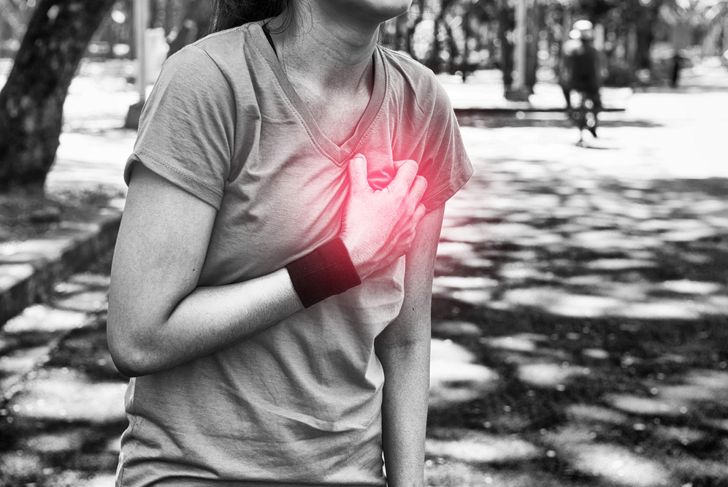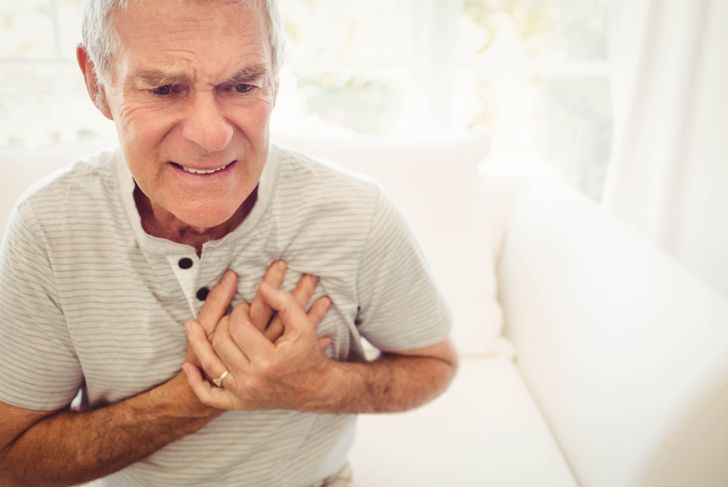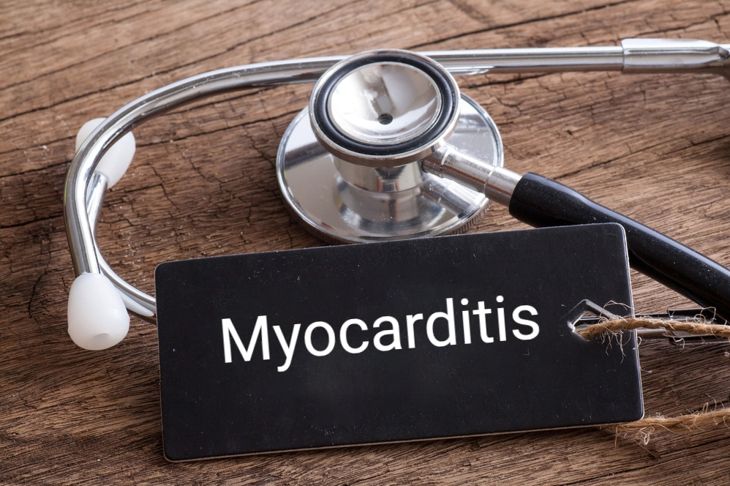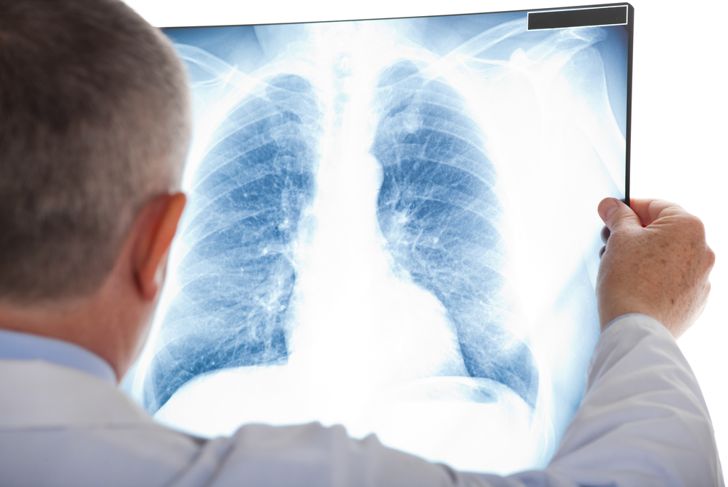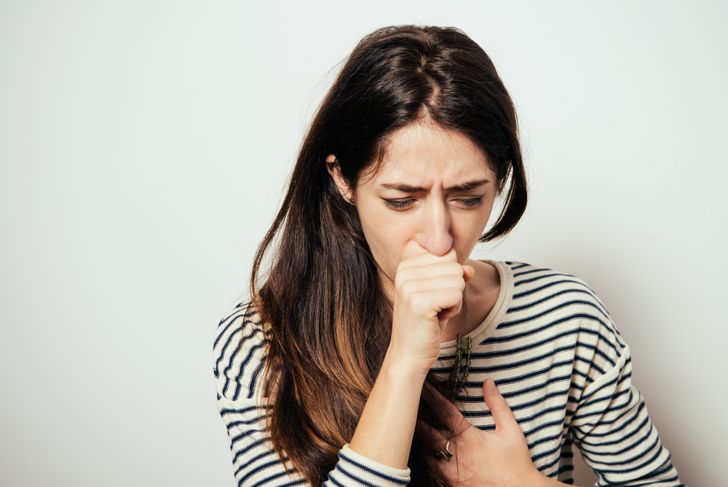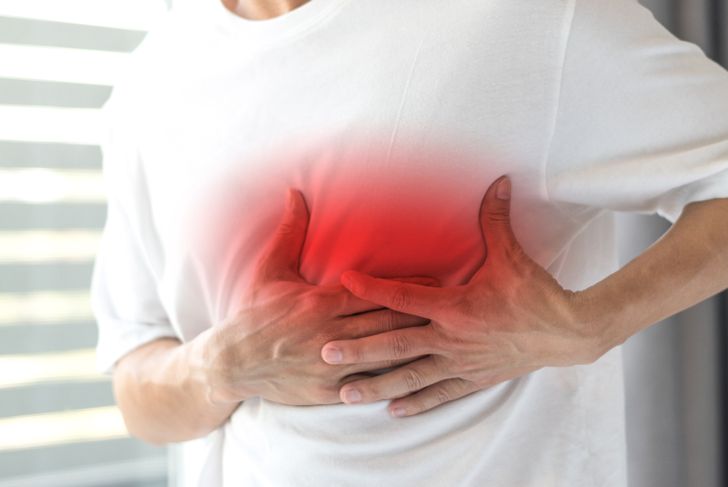Chest pain may be a sign of a life-threatening medical emergency, or it may be an uncomfortable symptom of a minor and temporary ailment. One might feel this symptom anywhere between the neck and the upper abdomen, and it may feel dull, aching, burning, stabbing, tight, or sharp. People often think chest pain indicates a heart problem, but this is not always the case. However, it’s important to rule out heart problems as a cause of chest pain before looking for another less serious cause.
Angina
Angina, caused by reduced blood flow to the heart, is often mistaken for a heart attack. People who experience angina may feel a squeezing or tightness in the chest. The condition most commonly occurs in people with heart disease, and it is considered a warning sign for future cardiovascular events. Stable angina is the most common type, and it usually occurs along with physical exertion or stress. It may be a recurring problem, and often people are aware of what triggers an event. Unstable angina is a medical emergency; the decreased blood flow can last up to half an hour, even without a trigger. Unlike stable angina, typically brought on by activity, unstable angina may occur at rest. Angina that becomes more severe, frequent, or longer-lasting is also classified as unstable angina. The main difference between angina and heart attack is that angina is a temporary reduction of blood flow to the heart muscle. In contrast, a heart attack occurs when blood clot forms in a blood vessel that carries blood to the heart and completely blocks it. This can cause permanent damage to the heart muscle.
Heart Attack
A heart attack or myocardial infarction occurs when an obstruction prevents the heart muscle from getting enough blood. According to the CDC, 790,000 Americans have a heart attack each year. The event usually presents as chest pain accompanied by pain in the arm, back, jaw, neck or stomach, or shortness of breath, cold sweats, nausea, or fatigue. The more quickly one seeks medical attention for a heart attack, the more likely they will experience a full recovery. An individual doesn’t have to experience all of these symptoms to be having a heart attack. One should seek medical attention for all chest pain that lasts longer than 5 minutes or is associated with shortness of breath, lightheadedness, nausea, sweating, or dizziness.
Myocarditis
Just like any other muscle in the body, the heart muscle (myocardium) can become inflamed. Usually, myocarditis affects people with infections such as Epstein-Barr virus (EBV), Hepatitis C, HIV, chlamydia, streptococcal, or staphylococcal bacteria. Symptoms include shortness of breath, abnormal heartbeat, fainting, light-headedness, fatigue, fever, muscle aches, and swollen joints, legs, or neck veins. Infection with a virus or bacteria is a common cause of myocarditis, but it can also be brought on by a reaction to some medications or chemicals, as well as inflammation associated with an autoimmune disease or other underlying illness.
Pulmonary Embolism
A blocked artery can cause a pulmonary embolism, a blood clot which blocks blood flow not to the heart but to the lungs. The blood clot travels through the vessels, usually from the leg, and becomes lodged in an artery that supplies blood to the lungs. Symptoms of pulmonary embolism are similar to those of a heart attack. An individual may experience shortness of breath, rapid heart rate, and chest pain. He or she may cough up blood. Pulmonary embolisms can be life-threatening if not treated promptly. Anyone at risk of blood clots should speak to a doctor about preventative measures.
Musculoskeletal Injury
The ribs surround and protect the soft inner organs, including the heart and lungs. A few conditions can affect this protective cage and cause chest pain. Costochondritis is inflammation of the cartilage and bones in the chest wall. Another cause of chest pain may be bruising of the ribs due to trauma, such as a car accident or sports injury. An injured or pulled muscle in the thoracic wall may also cause chest pain. According to the Canadian Medical Association Journal, injury to the musculoskeletal structure of the thoracic wall is often mistaken for angina pectoris, pleurisy, or another serious disorder.
Pneumonia
Pneumonia is an infection of the lungs that varies in severity. It may be caused by bacteria, a virus, or a fungus. Most healthy young adults recover from pneumonia with therapy in a few weeks. However, the infection can be life-threatening for babies, older adults, and people with compromised immune systems. Pneumonia causes a bad cough that usually produces mucus. Affected individuals may feel short of breath, have a fever, and experience chest pain that gets worse when they cough or inhale.
Pleurisy (Pleuritis)
Pleurisy is a type of chest pain that originates from the pleura, a thin layer of connective tissue that surrounds the lungs and keeps them from rubbing against the chest cavity when inhaling. When the pleura is inflamed or infected, breathing becomes painful. The layers of pleura may rub against each other or the chest cavity, causing stabbing chest pain. A virus or bacteria may cause pleurisy. If the cause is bacterial, doctors may prescribe antibiotics. Viral pleurisy often goes away on its own.
Acid Reflux and GERD
Gastroesophageal reflux disease (GERD) causes the sphincter between the esophagus and stomach to open when it should not and allow stomach acid to move up into the esophagus. This can be painful and may even damage the esophagus over time. Acid reflux is similar but refers to singular instances of this event, rather than a chronic issue. Heartburn can result from both issues, and causes pain or burning in the chest.
Panic Attack
A panic attack is a physiological reaction to fear or stress. Panic attacks themselves are not life-threatening, but their symptoms can feel similar to a heart attack. An attack can cause shortness of breath, tightening of the chest, numbness, shaking, sweating, and chest pain. Chronic panic attacks can be due to an overarching condition such as post-traumatic stress disorder, anxiety, or depression. The events generally resolve within half an hour. Therapy and medication can treat recurring panic attacks.
Sore Muscles
A persistent cough is the most common cause of sore muscles that cause chest pain. Repeated coughing strains and aggravates the chest muscles. Muscle cramps can also develop due to overuse from exercise or repetitive activity, and dehydration. Chronic pain syndromes such as fibromyalgia also cause sore muscles. Unlike muscular pain elsewhere in the body, it is best to see a doctor about chest pain, as the true cause can be difficult to pinpoint by symptoms alone.

 Home
Home Health
Health Diet & Nutrition
Diet & Nutrition Living Well
Living Well More
More